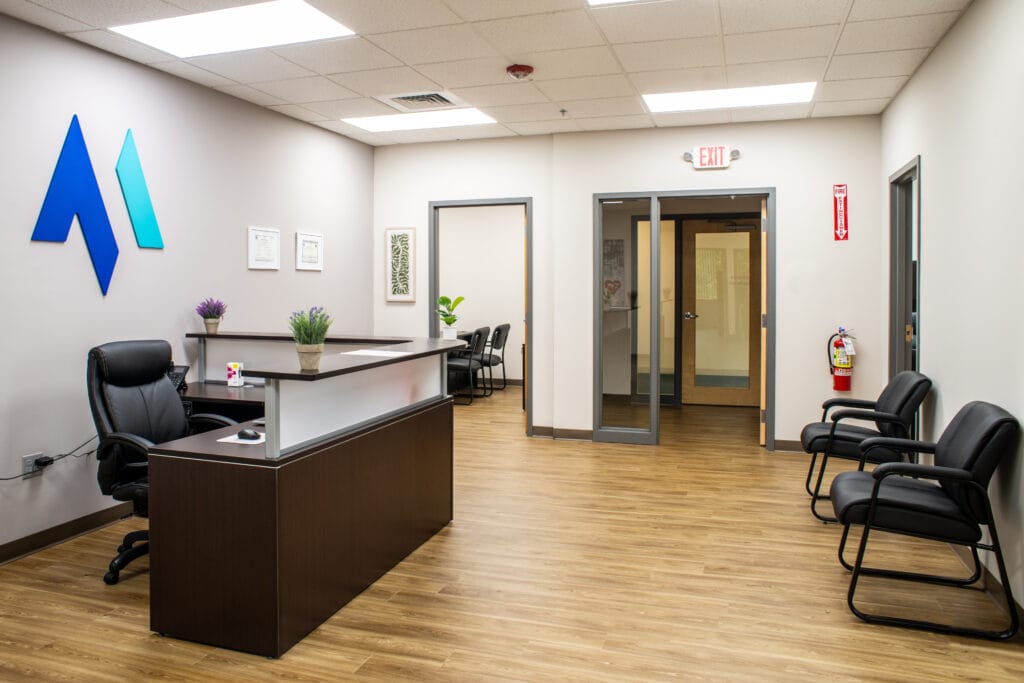Depression is more than just feeling sad—it’s a real mental health condition that affects your emotions, thoughts, and how you manage daily life. It can take a serious toll on your well-being, both emotionally and physically, and often impacts your quality of life. At Meta Addiction Treatment, we offer caring and comprehensive depression treatment. We aim to support individuals dealing with depression, helping them rediscover hope and begin the healing process.
Depression doesn’t look the same for everyone. There are several types, each with its own symptoms and struggles:
Major Depressive Disorder (MDD): This is the most well-known type. It involves deep, persistent sadness and a lack of interest in life’s activities for at least two weeks.
Persistent Depressive Disorder (PDD): Also called dysthymia, this form lasts for two years or more. The symptoms may not be as intense as MDD, but the long-lasting nature can still seriously disrupt life.
Bipolar Disorder: This condition includes cycles of depression and mania. One phase is marked by low mood and energy, while the other brings high energy, impulsivity, and elevated mood.
Seasonal Affective Disorder (SAD): Typically occurs in the fall and winter months due to reduced sunlight. It can lead to low energy, mood changes, and a sense of hopelessness.
Postpartum Depression: Some women experience intense sadness, anxiety, and exhaustion following childbirth, which can make bonding with the baby difficult.
Premenstrual Dysphoric Disorder (PMDD): A severe form of premenstrual syndrome (PMS), PMDD causes intense emotional symptoms just before menstruation begins.
Situational Depression: Triggered by life events—such as a breakup, job loss, or grief—this form often improves as the triggering situation resolves.
Atypical Depression: This one’s tricky. People may respond to positive events with temporary mood boosts, but still struggle with symptoms like excessive sleeping, overeating, and extreme sensitivity to rejection.
Recognizing the type of depression you’re dealing with is a crucial step toward getting the right help. There’s no one-size-fits-all solution—each journey is unique.

Depression isn’t just about emotions. It impacts your body, your thoughts, your behavior, and your relationships.
Even though depression is a mental health condition, it has very real physical effects. One of the most common? Persistent fatigue. You might sleep all night and still wake up exhausted. Everyday tasks like showering or cooking feel monumental.
Sleep problems are also common—some can’t sleep at all, while others oversleep but still feel drained. You might also deal with unexplained aches, muscle tension, headaches, or stomach issues like nausea and constipation. These symptoms often don’t respond to typical treatments because they’re tied to emotional distress.
Depression can weaken your immune system, making you more prone to illness. It can also affect your appetite—causing you to eat too much or too little—and that can lead to weight changes and other health complications, like heart disease or diabetes.
Over time, the body’s response to ongoing stress and emotional pain can raise the risk of serious conditions like high blood pressure or stroke. This creates a vicious cycle: your body feels worse, your depression deepens, and getting help feels even harder.
Emotionally, depression warps how you think and feel. It can trap you in a cycle of negative thoughts, making you feel worthless, hopeless, or overwhelmed with guilt—often without any clear reason. Things you used to enjoy may feel dull or meaningless.
It also affects your cognition—making it harder to focus, remember things, or make decisions. This “brain fog” can interfere with work, school, and relationships.
In severe cases, depression may lead to suicidal thoughts. Emotional pain can become constant, leaving you feeling numb or deeply sad. Many people also experience irritability, frustration, or anger—emotions that can strain relationships and push people away.
Depression often leads to social withdrawal, where people isolate themselves because they feel like a burden or think no one understands. This isolation can worsen symptoms and make it harder to ask for support.
Depression doesn’t stay contained—it seeps into every part of life, especially your relationships. Keeping up with loved ones feels overwhelming when you’re emotionally drained. It’s common to cancel plans, ignore texts, or retreat entirely from social situations, which can lead to even more loneliness.
Unfortunately, friends and family might misinterpret this as being flaky or distant, not realizing it’s a symptom of depression. That misunderstanding can create conflict or distance in relationships that were once strong.
At work or school, depression can lead to missed deadlines, reduced focus, and lower performance. This might result in job loss or academic struggles, which only adds to stress and emotional weight.
Even basic communication becomes a challenge. Trying to explain how you feel—or resolve conflict—can seem impossible, leading to more misunderstandings and emotional disconnection.
The more someone pulls away, the harder it is to break the cycle. That’s why social support and compassionate care are so essential.
Depression affects people in different ways, and the signs can show up across many areas of life. While some symptoms are easy to spot, others may be more subtle or mistaken for something else. Understanding the physical, behavioral, and psychological signs of depression is an important step toward recognizing when you or someone you care about may need support.
Depression doesn’t just impact the mind—it takes a real toll on the body, too. These physical symptoms often linger and may not respond to usual medical treatments, because they’re rooted in emotional distress. Common physical signs of depression include:
Persistent fatigue or low energy
Changes in sleep patterns (insomnia or oversleeping)
Appetite or weight changes (eating too much or too little)
Aches, pains, or headaches without a clear cause
Digestive problems (nausea, constipation, IBS)
Slowed movement or speech
Weakened immune system or frequent illness
Depression can subtly (or drastically) change the way a person acts day to day. These changes in behavior often reflect a loss of interest or motivation and can affect work, relationships, and daily responsibilities. Common behavioral signs of depression include:
Withdrawing from friends, family, or social activities
Neglecting responsibilities at work, school, or home
Avoiding previously enjoyable activities
Increased use of alcohol or drugs
Crying more often or without a clear reason
Slower reaction times or noticeable restlessness
Skipping meals, hygiene, or daily routines
At its core, depression is a mental health condition that deeply affects how a person thinks and feels. These psychological signs can be especially distressing and are often the most difficult to talk about. Common psychological signs of depression include:
Persistent sadness, emptiness, or hopelessness
Feelings of guilt, worthlessness, or helplessness
Trouble concentrating, remembering, or making decisions
Loss of interest in hobbies or passions
Irritability, frustration, or mood swings
Low self-esteem or negative self-image
Thoughts of self-harm or suicide

There’s no single, one-size-fits-all fix for depression. True recovery comes from a balanced approach—combining medical treatment, therapy, healthy lifestyle changes, and emotional support. Since depression affects everyone differently, it’s important that each person’s treatment plan is tailored to meet their unique needs and challenges.
The good news? Depression is highly treatable. With the right mix of support, tools, and guidance, it’s entirely possible to move through the darkness and reconnect with peace, purpose, and joy.
Talk therapy is one of the most effective ways to work through depression. It gives people a safe space to explore their emotions, challenge unhelpful thoughts, and learn healthier coping strategies. Different therapeutic approaches offer their own benefits:
Cognitive-Behavioral Therapy (CBT): Helps identify and reframe negative thinking patterns, promoting more balanced, constructive thoughts.
Dialectical Behavior Therapy (DBT): Focuses on emotional regulation, mindfulness, and building resilience to stress.
Interpersonal Therapy (IPT): Centers around improving relationships and resolving interpersonal issues that may contribute to depression.
Psychodynamic Therapy: Dives into past experiences and unresolved emotional conflicts that influence current feelings and behaviors.
In many cases, antidepressant medications can play a key role in treatment by helping to restore balance to brain chemistry. Some of the most commonly prescribed include:
SSRIs (e.g., Prozac, Zoloft, Lexapro): Target serotonin levels to improve mood.
SNRIs (e.g., Cymbalta, Effexor): Affect both serotonin and norepinephrine.
TCAs and MAOIs: Older classes of antidepressants typically used when other options haven’t worked.
Finding the right medication may take time, and it often involves some trial and error. But under medical supervision, many people find significant relief and a renewed sense of stability.
Small daily habits can make a big impact. Lifestyle changes aren’t a replacement for treatment, but they’re powerful tools in supporting recovery.
Exercise: Regular movement—like walking, yoga, or dancing—boosts endorphins and improves mood.
Nutrition: A diet rich in brain-healthy foods like leafy greens, fatty fish, nuts, and whole grains can support emotional well-being.
Sleep: Consistent sleep routines and good sleep hygiene improve energy and mood regulation.
Stress Management: Practices like meditation, journaling, deep breathing, or spending time outdoors help soothe the mind.
Connection: Staying socially engaged—whether through friends, family, or support groups—helps combat isolation and loneliness.
In addition to traditional treatment, some people explore alternative options to enhance their healing journey. These can be meaningful add-ons, though they should always be used alongside professional care:
Acupuncture or massage therapy for physical relaxation and stress relief
Aromatherapy to create calming environments
Art and music therapy as creative emotional outlets
Herbal supplements like St. John’s Wort—though it’s important to consult with a doctor before starting any supplements
Recovering from depression takes time, patience, and compassion—for yourself and from others. There may be setbacks, but with the right support and resources, healing is more than possible. If you or someone you love is struggling, remember: you’re not alone. Help is available, and brighter days can lie ahead.

If you or a loved one needs help with mental health, call us today at 844-909-2560, or email us at info@metaaddictiontreatment.com. You can also visit any one of our three locations, which are open 24/7:
At Meta, we are committed to providing comprehensive depression treatment solutions that empower individuals to overcome the challenges of depression and reclaim their lives. From evidence-based therapies to medication management, holistic approaches, and ongoing support, our holistic approach addresses the unique needs of each individual on their journey towards lasting recovery from depression.
If you or a loved one is struggling with depression, don't hesitate to reach out–contact us today to learn more about our depression treatment programs and take the first step towards healing and wellness.